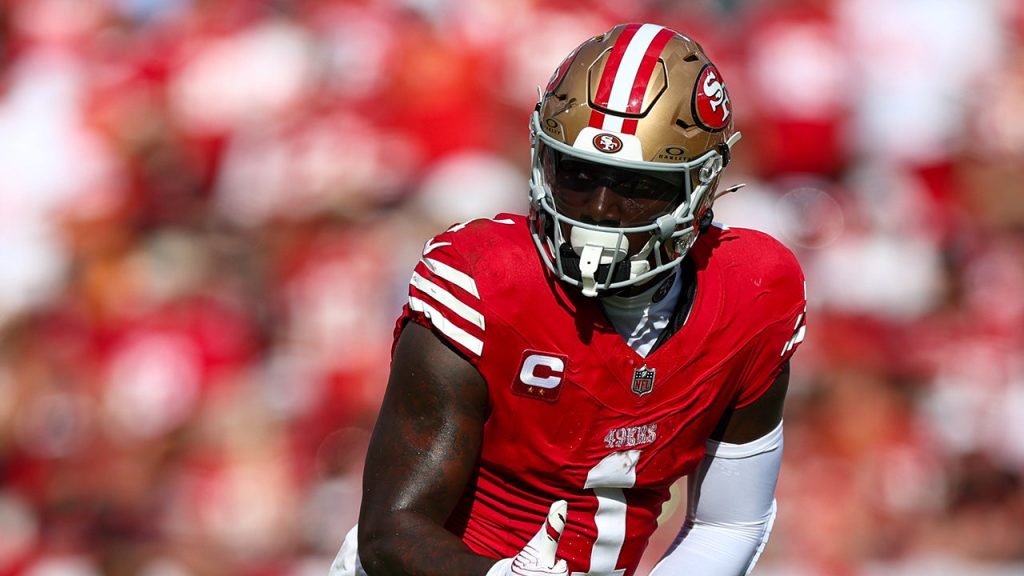Deebo Samuel, the San Francisco 49ers’ star wide receiver, found himself at the center of a media storm after a cryptic social media post expressing frustration over his lack of involvement in the team’s offense. The post, subsequently deleted, hinted at Samuel’s discontent with his current role, prompting speculation about a potential rift with quarterback Brock Purdy. While Samuel’s post garnered significant attention, it also drew criticism, particularly from X’s community notes feature, which pointed out Samuel’s struggles with dropped passes this season. This incident underscores the complexities of player-team dynamics in professional sports, highlighting the delicate balance between individual aspirations and team objectives.
Samuel’s frustration stems from what he perceives as a significant drop in his offensive production. He is currently experiencing the least productive stretch of his six-year NFL career, averaging a mere 2.9 yards per carry on his 32 rushing attempts. His receiving stats are equally concerning, with projections suggesting he’s on pace for his worst season in terms of both receptions and receiving yards per game. The absence of a touchdown since Week 6 further compounds his anxieties, fueling his public expression of discontent. This situation raises questions about Samuel’s evolving role within the 49ers’ offense and the potential impact on his long-term future with the team.
Head Coach Kyle Shanahan acknowledged Samuel’s frustration, expressing understanding for the receiver’s desire for increased involvement in the offensive game plan. Shanahan’s comments suggest a recognition of Samuel’s importance to the team’s success and a willingness to explore ways to maximize his contributions. However, Shanahan also expressed a preference for addressing such concerns internally, subtly critiquing Samuel’s decision to air his grievances publicly. This highlights the often-delicate balance between a player’s right to express their concerns and the team’s desire to maintain a unified front. The incident reveals the inherent tensions that can arise within a team environment, particularly when individual performance and expectations clash with overall team strategy.
Brock Purdy, the quarterback seemingly implicated in Samuel’s post, addressed the situation with a conciliatory tone. Purdy emphasized his close relationship with Samuel, describing him as one of his “best friends” on the team. He expressed a desire to get Samuel the ball more often, acknowledging the receiver’s talent and potential to break records. Purdy’s response suggests an attempt to diffuse the situation and reaffirm the team’s commitment to maximizing Samuel’s contributions. His explanation touched upon the complexities of offensive schemes and defensive strategies, highlighting how these factors can sometimes limit a player’s opportunities within a given game. This suggests a nuanced understanding of the factors contributing to Samuel’s decreased production, moving beyond simple blame attribution.
The incident raises broader questions about the role of social media in professional sports and the potential for misunderstandings and misinterpretations. While social media platforms provide athletes with a direct channel to communicate with fans and express their perspectives, they also carry the risk of amplifying internal team issues and creating unnecessary distractions. The speed and virality of social media can exacerbate such situations, often before all parties have had an opportunity to fully address and resolve the underlying concerns. This highlights the need for careful consideration and responsible use of social media platforms by professional athletes.
This episode involving Deebo Samuel underscores the complexities and challenges inherent in managing player relationships and expectations within a high-pressure, high-stakes professional sports environment. While Samuel’s frustration is understandable given his decreased production, his decision to air his grievances publicly highlights the potential pitfalls of using social media to address internal team matters. The responses from Coach Shanahan and quarterback Purdy suggest a desire to address Samuel’s concerns and find ways to reintegrate him more effectively into the offense. However, the incident serves as a reminder of the delicate balance required to maintain team unity and focus amidst individual aspirations and frustrations. The long-term impact of this episode on Samuel’s role within the 49ers and his relationship with his teammates remains to be seen, but it serves as a valuable case study in the dynamics of professional sports teams and the challenges of managing player relationships in the age of social media.


